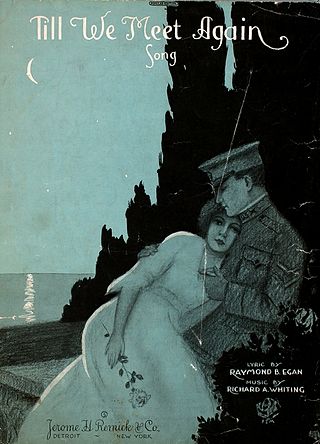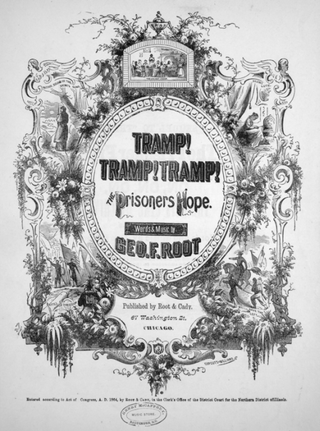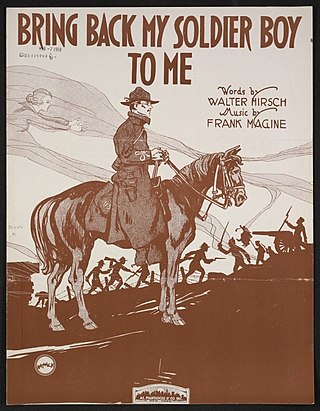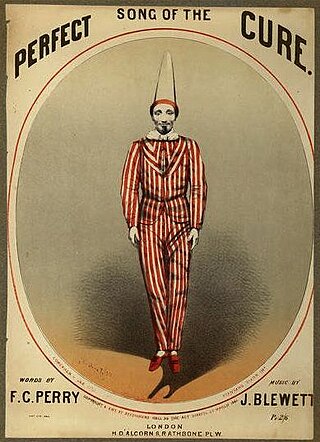Related Research Articles

"Waltzing Matilda" is a song developed in the Australian style of poetry and folk music called a bush ballad. It has been described as the country's "unofficial national anthem".

"John Brown's Body" is a United States marching song about the abolitionist John Brown. The song was popular in the Union during the American Civil War. The tune arose out of the folk hymn tradition of the American camp meeting movement of the late 18th and early 19th century. According to an 1889 account, the original John Brown lyrics were a collective effort by a group of Union soldiers who were referring both to the famous John Brown and also, humorously, to a Sergeant John Brown of their own battalion. Various other authors have published additional verses or claimed credit for originating the John Brown lyrics and tune.

The "Battle Hymn of the Republic", also known as "Mine Eyes Have Seen the Glory" or "Glory, Glory Hallelujah" outside of the United States, is a popular American patriotic song written by the abolitionist writer Julia Ward Howe.

"The Bonnie Blue Flag", also known as "We Are a Band of Brothers", is an 1861 marching song associated with the Confederate States of America. The words were written by the entertainer Harry McCarthy, with the melody taken from the song "The Irish Jaunting Car". The song's title refers to the unofficial first flag of the Confederacy, the Bonnie Blue Flag. The left flag on the sheet-music is the Bonnie Blue Flag.

"Marching Through Georgia" is a marching song written by Henry Clay Work at the end of the American Civil War in 1865. The title and lyrics of the song refer to U.S. Army major general William T. Sherman's "March to the Sea" to capture the Confederate city of Savannah, Georgia in late 1864.

"I've Been Working on the Railroad" is an American folk song. The first published version appeared as "Levee Song" in Carmina Princetonia, a book of Princeton University songs published in 1894. The earliest known recording is by the Shannon Quartet, released by Victor Records in 1923.

In the Shade of the Old Apple Tree is a popular song dating from 1905. It was written by Harry Williams and Egbert Van Alstyne (music). Popular recordings in 1905 were by Henry Burr; Albert Campbell; Haydn Quartet; and by Arthur Pryor's Band. Other recordings were by Duke Ellington, Louis Armstrong and The Mills Brothers and Alma Cogan (1962). Bing Crosby included the song in a medley on his album On the Sentimental Side (1962).

"Dixie", also known as "Dixie's Land", "I Wish I Was in Dixie", and other titles, is a song about the Southern United States first made in 1859. It is one of the most distinctively Southern musical products of the 19th century. It was not a folk song at its creation, but it has since entered the American folk vernacular. The song likely cemented the word "Dixie" in the American vocabulary as a nickname for the Southern U.S.
For The Dear Old Flag, I Die is an American Civil War song. It was originally a poem written by George Cooper. The music by Stephen Foster was later added in. The song interprets the last words of a drummer boy who was fatally wounded at the Battle of Gettysburg.
"Sussex by the Sea" is a song written in 1907 by William Ward-Higgs, often considered to be the unofficial county anthem of Sussex. It became well known throughout Sussex and is regularly sung at celebrations throughout the county. It can be heard during many sporting events in the county, during the Sussex bonfire celebrations and it is played by marching bands and Morris dancers across Sussex. It is the adopted song of Brighton & Hove Albion Football Club, Sussex Division Royal Naval Reserve, Sussex Association of Naval Officers and Sussex County Cricket Club.

"Just before the Battle, Mother" was a popular song during the American Civil War, particularly among troops in the Union Army. It was written and published by Chicago-based George F. Root. It was also a popular song with adherents of the Primrose League in England, and was a central part of Victoria Day celebrations in Canada during the late 19th and early-to-mid 20th centuries.

"Till We Meet Again" is an American popular song. The music was written by Richard A. Whiting, the lyrics by Raymond B. Egan in 1918. Written during the Great War, the song tells of the parting of a soldier and his sweetheart. The title comes from the final line of the chorus:
A war song is a musical composition that relates to war, or a society's attitudes towards war. They may be pro-war, anti-war, or simply a description of everyday life during war times.

"Tramp! Tramp! Tramp! " was one of the most popular songs of the American Civil War. George F. Root wrote both the words and music and published it in 1864 to give hope to the Union prisoners of war. The song is written from the prisoner's point of view. The chorus tells his fellow prisoners that hope is coming.

During the American Civil War, music played a prominent role on both sides of the conflict, Union and Confederate. On the battlefield, different instruments including bugles, drums, and fifes were played to issue marching orders or sometimes simply to boost the morale of one's fellow soldiers. Singing was also employed not only as a recreational activity but as a release from the inevitable tensions that come with fighting in a war. In camp, music was a diversion away from the bloodshed, helping the soldiers deal with homesickness and boredom. Soldiers of both sides often engaged in recreation with musical instruments, and when the opposing armies were near each other, sometimes the bands from both sides of the conflict played against each other on the night before a battle.

"Bring Back My Soldier Boy to Me" is a World War I era song written by Walter Hirsch and composed by Frank Magine. The song was copyrighted by Al Piantadosi & Co., Inc., New York in 1918.

"Say a Prayer for the Boys "Out There"" is a World War I era song released in 1917. Bernie Grossman wrote the lyrics. Alex Marr composed the music. It was published by Joe Morris Music, Co. of New York, New York. The sheet music cover was designed by the Starmer Brothers. It features a family praying at the dinner table. Behind them is a sentry guarding a campground of tents. There is an inset photo on the left side that varies per edition. The song was written for both voice and piano.

"Lonely Call" is a song by American singer and songwriter RaeLynn. It was released on June 26, 2017, as the second single from her debut studio album, WildHorse (2017). The song was written by RaeLynn, Nicolle Galyon, and Rob Hawkins.

James Hurst Stead was an English music hall comedian, popular for several decades from the 1850s.
References
- 1 2 3 Willard A. and Porter W. Heaps, The Singing Sixties: The Spirit of Civil War Days Drawn from the Music of the Times. University of Oklahoma Press, 1960, pp. 224–226.
- 1 2 3 Irwin Silber, Songs of the Civil War. Columbia University Press, 1960, pp. 117–118.
- 1 2 3 Frank W. Hoogerwerf, "Confederate Sheet Music at the Robert W. Woodruff Library, Emory University". Notes of the Music Library Association 34 (1977), pp. 7–26, at pp. 10–11.
- 1 2 3 Bruce Catton, Mr. Lincoln's Army. Doubleday, 1962, pp. 171–172.
- ↑ Heaps, p. 104.
- ↑ Heaps, p. 338.
- ↑ Silber, p. 127.
- ↑ ""Weeping, Sad and Lonely or When This Cruel War is Over" Historic Sheet Music Collection